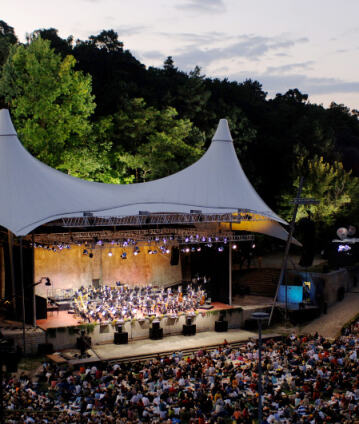Simon Rattle conducts Rhapsodies at the Waldbühne

The rhapsody is a very special musical genre: its main principle being its lack of principles – unbound by any formal requirements, a composer can indulge himself, lose himself in dreams, and be as poetic as he pleases. In 2007, Sir Simon Rattle conducted some of the best examples of the genre at the Berlin Waldbühne. At the same time, this concert is a kind of “hall of fame” of virtuosos of timbre, such as Chabrier, Delius, Rachmaninov, Dvořák, Debussy and Enescu.
With rhapsodies seeming particularly suited to portrayals of countries and landscapes, this concert resembled a musical journey through Europe: the Slav Antonín Dvořák, the Romanian George Enescu and the Englishman Frederick Delius all sang the praises of their home countries, and in Claude Debussy’s Première Rapsody, the solo clarinet gives the piece an unmistakably French flavour. Emmanuel Chabrier and Sergei Rachmaninov, on the other hand, looked to foreign climes for their inspiration: Chabrier to Spain, while Rachmaninov combined the Italian fire of Paganini with his own native Russian melancholy.
Other artists appeared along with chief conductor Sir Simon Rattle on the podium: pianist Stephen Hough made his Philharmoniker debut in the Rachmaninov, and Wenzel Fuchs, the orchestra’s principal clarinettist, played Debussy’s Rapsody “with a wonderfully soft tone and telling precision,” said Berlin’s Kulturradio. And then there was a surprising change of conductor at the very end, during the inescapable encore Berliner Luft, when Sir Simon swapped places with the flautist Michael Hasel, who then brought the evening to an end from the conductor’s stand.
© 2007 EuroArts Music International
Category
Artists
Our recommendations
- Simon Rattle and Katia and Marielle Labèque at the Berlin Waldbühne
- Simon Rattle conducts “Russian rhythms” at the Waldbühne
- Simon Rattle and Magdalena Kožená at the Waldbühne
- Simon Rattle conducts Beethoven and Mendelssohn at the Waldbühne
- Simon Rattle conducts film scores at the Waldbühne
- Gustavo Dudamel conducts Tchaikovsky and Brahms at the Waldbühne